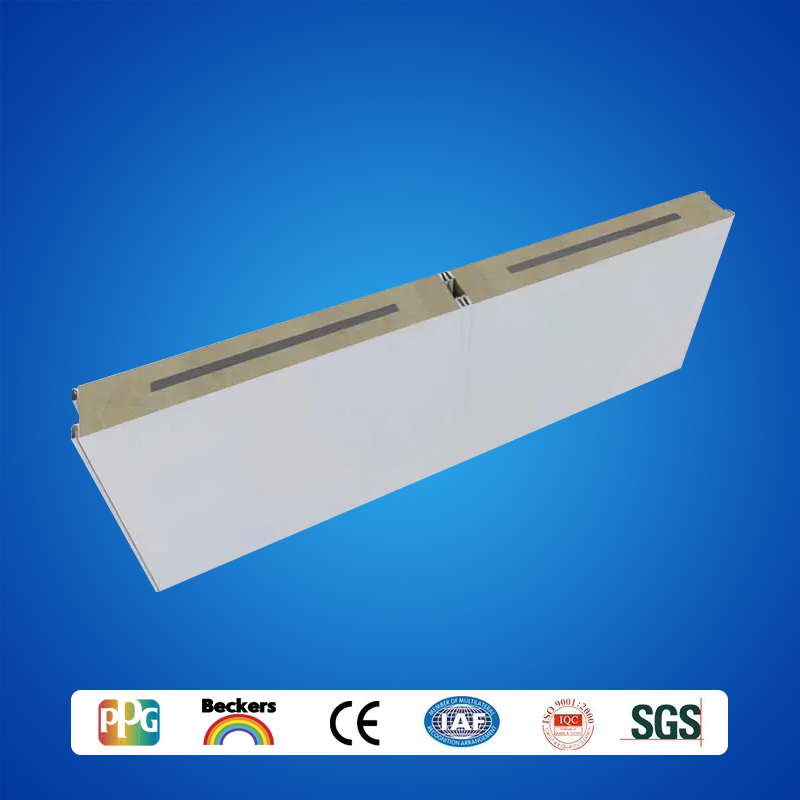
Introduction
In the demanding environment of marine engineering, effective noise control remains a critical challenge for vessel performance and occupant comfort. The Type C High Sound Reduction Marine Wall Panels represent a technological breakthrough in marine acoustics, incorporating advanced rock wool panel technology to deliver exceptional sound suppression capabilities. These rock wool composite panels combine superior acoustic performance with the durability required for harsh marine conditions.
| Type | CLP-P9 |
| Thickness (mm) | 50 |
| Weight kg/m2 | 18.4 |
| Sound reduction | 45db |
| Surface finish | PVC Film / Powder painted / Galvanized Steel / Stainless steel ? Aluminum plate |
Engineering Excellence and Design Innovation
The Type C panels utilize a sophisticated multi-layer architecture that maximizes acoustic attenuation while maintaining structural integrity:
- Core Rock Wool Layer
At the heart of these rock wool sandwich panels lies a high-density mineral wool core, specifically engineered for marine applications. This core material demonstrates exceptional sound absorption properties across frequencies from 100Hz to 4000Hz, with a noise reduction coefficient (NRC) exceeding 0.85. The rock wool’s interlocking fiber structure effectively traps sound waves, converting acoustic energy into minimal heat energy. - Advanced Composite Structure
The panels employ a unique sandwich panel configuration consisting of:- Outer layers of marine-grade aluminum or reinforced glass fiber
- Middle layer of compressed rock wool insulation
- Integrated vapor barrier membrane
This construction creates a mass-spring-mass system that effectively blocks sound transmission while providing thermal insulation.
- Surface Technology
The exterior surfaces feature anti-corrosive treatment and Class A fire-rated coatings, making these rock wool composite panels suitable for the most demanding marine environments.
Manufacturing Process and Quality Assurance
The production of these acoustic sandwich panels involves state-of-the-art manufacturing techniques:
- Material Selection
Premium basalt rock wool is selected for its superior acoustic and fire-resistant properties. The raw materials undergo rigorous testing to meet IMO FTP Code requirements. - Automated Production
Computer-controlled production lines ensure precise layering and compression of the rock wool panel components. The manufacturing process includes:- Automated adhesive application
- High-pressure compression bonding
- Precision cutting to specifications
- Quality control inspections at each stage
- Performance Testing
Every batch undergoes comprehensive testing including:- Acoustic performance verification (ASTM E90, ISO 354)
- Fire resistance testing (IMO FTP Code Part 2)
- Environmental durability testing
- Mechanical strength validation
Technical Specifications and Performance
- Sound Transmission Class (STC): 38-45 dB
- Fire Rating: A-60 class certification
- Water Resistance: <0.5% water absorption
- Density: 80-120 kg/m³
- Temperature Resistance: Up to 850°C
- Thickness Options: 50mm, 75mm, 100mm
Applications and Installation Advantages
These rock wool sandwich panels are designed for diverse marine applications:
- Engine Room Enclosures
The high-temperature resistance of the rock wool panel core makes it ideal for machinery spaces, reducing noise levels by up to 25 dB. - Accommodation Areas
The sandwich panels provide effective sound insulation between cabins and public spaces, ensuring passenger comfort. - Technical Spaces
Suitable for radio rooms, control centers, and other areas requiring acoustic separation. - Installation Benefits
- Modular design for quick installation
- Lightweight construction (40% lighter than traditional materials)
- Pre-fabricated utility openings
- Compatibility with various finishing systems
Environmental and Safety Features
- Eco-Friendly: Contains minimum 40% recycled content
- Non-Toxic: Free from asbestos and CFCs
- Low Smoke Emission: Meets IMO low smoke requirements
- Recyclable: Materials can be repurposed at end-of-life
Comparative Advantages
Compared to conventional marine acoustic materials, Type C rock wool composite panels offer:
- 30% better sound absorption
- 50% faster installation
- 40% weight reduction
- Enhanced fire safety performance
- Superior moisture resistance
Case Study: Implementation on Cruise Vessels
Recent installations on luxury cruise ships have demonstrated the effectiveness of these sandwich panels. Post-installation measurements show:
- 22 dB reduction in engine noise transmission
- 35% improvement in cabin acoustic comfort
- Significant reduction in vibration transmission
Maintenance and Longevity
The rock wool panel construction requires minimal maintenance:
- Resistant to mold and mildew
- Does not settle or degrade over time
- Easy to clean and maintain
- Service life exceeding 25 years
Compliance and Certification
The Type C panels meet or exceed:
- IMO FTP Code requirements
- SOLAS acoustic and fire safety standards
- DNV GL and ABS certifications
- EU CE marking requirements
Conclusion
The Type C High Sound Reduction Marine Wall Panels with rock wool sandwich panel technology represent the pinnacle of marine acoustic innovation. By combining advanced rock wool composition with sophisticated engineering, these panels deliver unmatched acoustic performance while meeting the stringent safety and environmental requirements of modern marine applications. Their proven effectiveness in reducing noise transmission, coupled with excellent fire resistance and environmental credentials, makes them the ideal choice for shipbuilders and operators seeking to enhance vessel comfort and safety.
As the marine industry continues to prioritize acoustic comfort and environmental sustainability, these rock wool composite panels stand ready to meet evolving challenges while setting new standards in marine acoustic technology. Their versatility, performance, and reliability make them an indispensable component in modern vessel construction and refurbishment projects.

